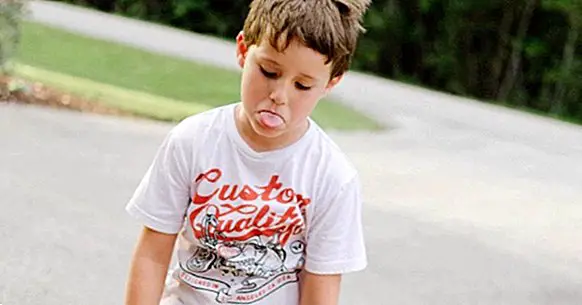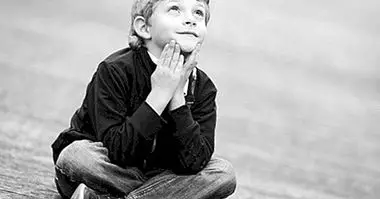The theory of moral development of Jean Piaget
The human being lives in society, interacting continuously with their peers and having their own consequences on others. In this context, a whole code has been developed not only normative, but also moral according to shared beliefs about what is or is not acceptable or the values we follow.
Although from the moment we are born we are immersed in it, the truth is that morality does not arise spontaneously but is gradually developing throughout our evolution and maturation. This has a huge scientific interest, and many authors have explored and developed theories about how morality appears in the human being. Among them we can find the theory of moral development of Jean Piaget , of which we are going to talk throughout this article.
- Related article: "Jean Piaget's Theory of Learning"
Piaget and mental development
Jean Piaget is one of the most recognized authors regarding the study of child development , being one of the parents of evolutionary psychology.
One of his most important contributions is his theory of cognitive development, in which the child goes through different stages of development (sensorimotor, preoperational, concrete operations and formal operations) in which he reconfigures his own cognition as he goes organizing or assimilating information, as well as Acquiring different faculties and mental abilities and making his thinking increasingly complex.
But although Piaget focused on the development of mental faculties and thinking / reasoning, he also valued and generated a theory of moral development.
The theory of moral development of Piaget
Piaget's theory of moral development is deeply linked to his theory of cognitive development. Morality is valued as a set of rules that the child is able to obey and understand to a greater or lesser extent, generally linked to the idea of justice.
The author considers that in order to talk about morality it will be necessary to acquire a level of development equivalent to two years of age, equivalent to the preoperational period (previously it is considered that there is not enough mental capacity to talk about something similar to the moral).
From this point, the human being will be developing a moral increasingly complex according to their cognitive capacity is becoming greater and capable of abstract thinking and hypothetical-deductive. Thus, the evolution of morality depends on that of one's own cognitive abilities: in order to advance it is necessary to reorganize and add information to previously existing schemes , in such a way that a deeper and more critical knowledge can be developed with the consideration that a certain behavior deserves.
In addition to this, interaction with their peers will be necessary, as the main mechanism for acquiring information and leaving aside the egocentricity proper to the first stages of life. Finally, it is essential that, little by little and as the skills and the hypothetical-deductive thinking are acquired and mastered, there is a progressive distancing and independence of the parents and their point of view, this being necessary for a certain development to take place. relativism and own critical capacity.
Although Piaget's theory of moral development is not currently the best considered, the truth is that his studies served as inspiration and even as a basis for the development of many others. This includes Kohlberg's theory , probably one of the best known.
- You may be interested: "The theory of moral development of Lawrence Kohlberg"
Stages of moral development according to Piaget
In the theory of moral development of Piaget, the author proposes the existence of as we have said a total of three phases or stages (although it is the last two that would be properly moral), which the minor is going as it acquires and integrating more and more information and cognitive skills. The three stages or proposed stages are the following .
1. Premoral or adult pressure stage
In this first stage, which corresponds to a level of development equivalent to that of a child between two and six years of age, language emerges and they begin to identify their own intentions , although there is no understanding of the moral concept or the norms.
The patterns of behavior and the limitations to this depend entirely on the external imposition on the part of the family or the figures of authority, but the rule or moral norm is not conceived as something relevant per se.
2. Solidarity between equals and moral realism
The second of the stages of moral development occurs between five and ten years, appearing the rules as something from outside but that is understood as relevant and mandatory, being somewhat inflexible.
The breaking of the norm is seen as something entirely punishable and seen as a fault, thus being poorly viewed. The idea of justice and honesty arises, as well as the need for mutual respect among equals.
The lie is frowned upon, and the punishment for dissent is accepted without taking into account possible mitigating variables or intentions, the consequences of the behavior being relevant .
Over time, the rules are no longer seen as something imposed by others but that are still relevant per se without requiring an external motivation.
3. Autonomous moral or moral relativism
This stage arises approximately from the ten years of age, in the stage of the concrete operations and even in the beginning of the formal ones. In this stage the minor has already reached the capacity of use logic when establishing relationships between information and phenomena that lives .
As of approximately twelve years old, there is already the capacity to operate with abstract information. This makes it appear little by little a greater understanding of the situations and the importance of different factors when taking into account the rules, such as the intention.
It is at this stage that a critical moral is reached, becoming aware that the rules are interpretable and that obeying them or not can depend on the situation and one's own will: it is no longer necessary for the norm to be obeyed always but it will depend on the situation.
It also assesses individual responsibility and proportionality between action-punishment. Lying is no longer seen as something negative per se unless it involves betrayal.
Bibliographic references:
- Piaget, J. (1983). The moral judgment of the child. Editorial Fontanella.
- Sanz, L.J. (2012). Evolutionary and educational psychology. CEDE Preparation Manual PIR, 10. CEDE: Madrid.
- Vidal, F. (1994). Piaget before Piaget. Cambridge, MA: Harvard University Press.



















